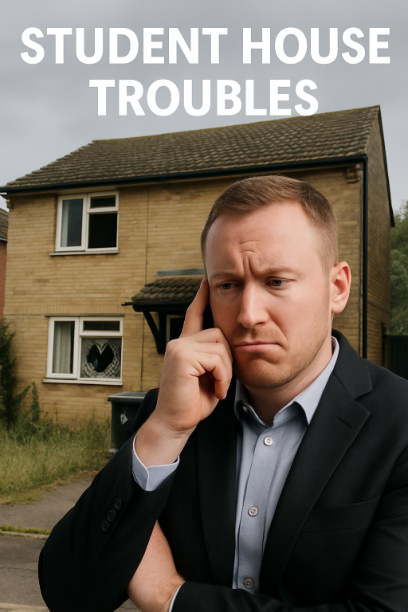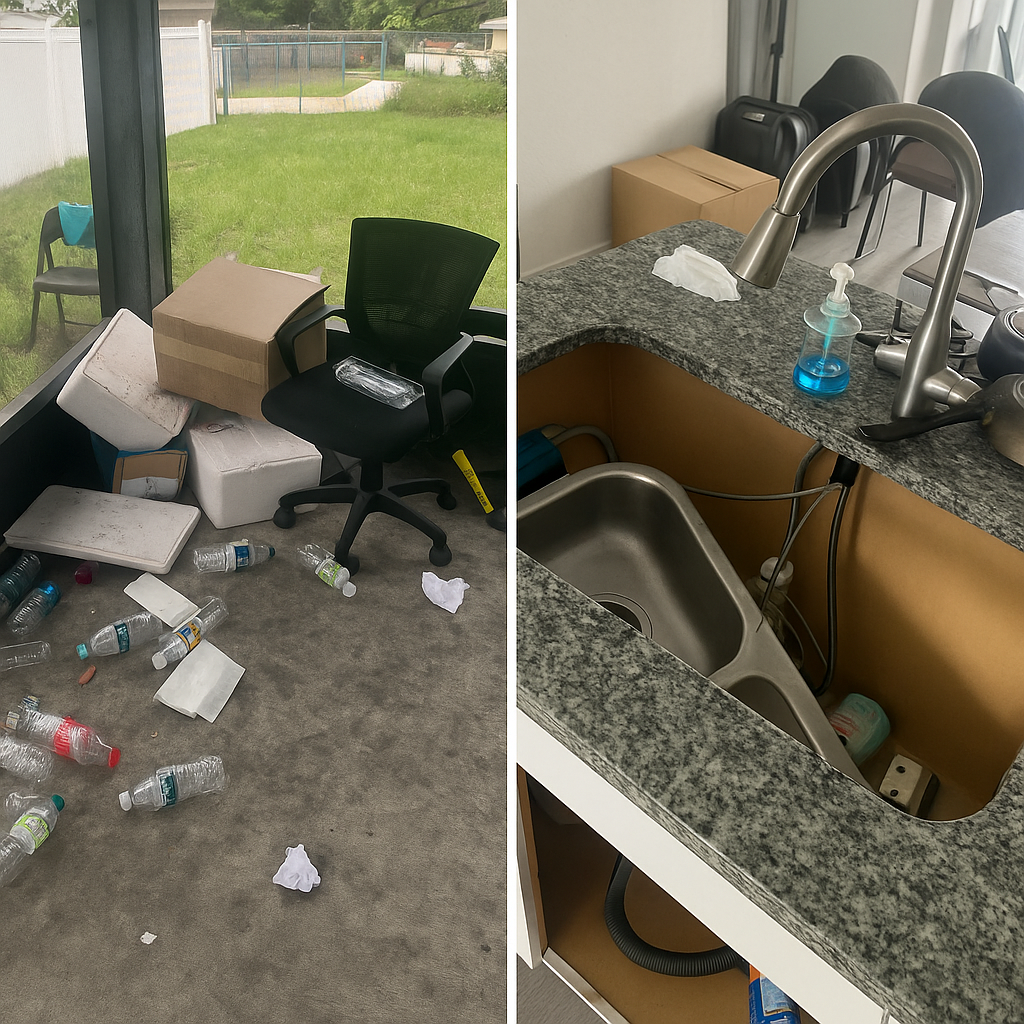
A “Safe Bet” Gone Sideways
Bradley is one of those agent-investors we all admire. Sharp, experienced, hands-on, and usually five steps ahead of any mess. But even the best of us have that one deal that humbles us. And for Bradley, that deal came wrapped in a neat package: a rental in a college town, fully leased to a group of international students. The numbers looked great. Rent was solid. Property was in a prime location. And the tenants? Polite, respectful, and academically focused. A goldmine, right?
Not quite.
This is the story of how that student rental turned into a near-nightmare. But more importantly, it’s a guide for every investor and agent out there who thinks renting to students is easy money. There’s a lot more to it—especially when those students don’t have jobs, and the only thing backing the lease is a phone call that starts with, “My dad’s covering it.”
The Setup: Students, No Income, and Too Much Trust
Bradley had done his homework. The rental was in high demand thanks to its proximity to a major university. The strategy was simple: target student tenants whose parents would foot the bill. And that’s exactly what he got.
Each of the students claimed their parents would be sending money monthly to cover rent and expenses. There was no real income to verify on the applications—these kids weren’t working jobs, they were studying. But Bradley, like many landlords before him, took their word for it. After all, their English was good, their demeanor was respectful, and they had cash for the first month and the deposit. What could go wrong?
Here’s the thing: Bradley never asked the parents to co-sign. No written guarantees. No additional agreements or verification beyond the students saying, “Our parents got it.” It was all based on trust.
The Red Flags Start Popping Up
Everything was fine—until it wasn’t. One tenant started acting out. We’re not talking about loud music or dirty dishes. We’re talking malicious behavior. Running the water nonstop. Blasting the AC with windows open. Racking up utility bills like it was a game.
Utilities, by the way, were in the tenants’ names. That meant Bradley had no control and no visibility unless something got shut off. It also meant that if one tenant decided to go off the rails, there was no immediate recourse other than warnings, fines, or eventually, eviction.
This wasn’t just one of those “kids will be kids” moments. This was sabotage.

Recreation of the actual damage — Based on real photos from the property. From trashed patios to torn-out sinks, these scenes reflect what investor agents like Bradley actually walk into sometimes.
Damage Control Begins
When Bradley finally realized what was going on, he jumped into action. He reached out to the parents—the ones who had supposedly been paying all along. Fortunately, they were cooperative. They offered to pay for the damage. But that wasn’t guaranteed. He had no legal standing to make them pay. Everything was based on goodwill.
And here’s the danger: if the damages go beyond the security deposit, and there’s no formal agreement with the parents, you’re heading straight into the gray zone of civil court.
The 24-Hour Notice Slip-Up
In the heat of the moment, Bradley almost made another critical mistake. Frustrated with the situation, he wanted to inspect the property to see what else might be going wrong.
But then he stopped himself.
You see, even though it was his property, he couldn’t just walk in. Under Florida law (and many others), landlords must give 24-hour notice before entering a rental—except in emergencies. No notice? That’s potentially trespassing. And the worst part? If the tenants knew their rights, they could sue.
Bradley knew the law well enough to catch himself before making it worse. But imagine if this had happened to someone less experienced?
Cultural Barriers and Legal Risks
Let’s add another layer here. These students were from South Korea. Cultural expectations around landlords and property rights vary widely across the globe. In some countries, it’s normal for the owner to enter at will. In others, it’s taboo to question authority.
This dynamic can cause serious confusion. Tenants may not assert their rights when they should, or worse, misunderstand your actions and call their embassy. Yes, that has happened in other cases.
It’s a delicate balance, and it starts with communication and clear expectations from day one.
Lessons for Agents and Investors Alike
This story isn’t about shaming students or avoiding international tenants. It’s about protecting your investment and learning from real-world experience. Here are the key takeaways:
-
Require a Co-Signer or Parental Guarantor If your tenant has no income, someone must back them up—in writing. A parent guarantee can save you from financial disaster. Make it part of your standard lease process for student housing.
-
Don’t Rely on Verbal Promises “My dad will pay” doesn’t hold up in court. Always document everything. Phone calls are not contracts.
-
Keep Utilities in Your Name When things go sideways, controlling the utilities gives you leverage. Bill tenants back through a flat fee or submetering if possible.
-
Know Your Landlord-Tenant Laws Cold That 24-hour notice rule? It’s not optional. It’s law. Violating it could not only get you sued but damage your reputation. As an agent-investor, you must know your rights and responsibilities.
-
Use Clear Move-In / Move-Out Inspections Document the condition of the property at move-in. Photos, video, and signed checklists are your best friend when it comes to handling disputes later.
-
Address Red Flags Immediately Malicious behavior, threats, and utility abuse are not normal. Address them fast, document everything, and if needed, begin the eviction process early. Waiting only makes it worse.
-
Student Rentals Are Not Passive Don’t let anyone fool you into thinking student rentals are “easy money.” They are active investments that require structure, follow-up, and good systems.
-
Culture Matters Understand where your tenants are coming from—literally. If English isn’t their first language or they come from a place with very different housing laws, take extra time to explain expectations.
-
Legal Counsel is Worth It Have a landlord-tenant attorney on speed dial. Especially when managing multi-tenant properties, or when you’re working across language and culture barriers.
-
You Can Still Win Despite everything, Bradley came out okay. Why? Because he took action, kept his cool, and learned fast. And now he’s sharing the lesson with the rest of us.
Final Thoughts: Learn or Lose
You don’t need to have a horror story like Bradley’s to get smart. Learn from others. Protect yourself. Build systems. Student rentals can be incredibly profitable, but only if you treat them like the serious business they are.
Bradley’s honesty in sharing this story is what makes him the kind of investor we respect. He could’ve kept it quiet, but instead, he used it to help the next investor avoid the same landmines.
So if you’re in the game, take notes. Whether you’re a solo investor, an agent managing for clients, or part of a team, this stuff matters. Because the moment you let your guard down—that’s when the problems walk through the front door with a backpack and a tuition check.
Closing:
Keep it consistent, stay patient, stay true—if I did it, so can you. This is Jorge Vazquez, CEO of Graystone Investment Group and all our amazing companies, and Coach at Property Profit Academy. Thanks for tuning in—until the next article, take care and keep building!
If you’d like to connect directly with me, feel free to book a time here: https://graystoneig.com/ceo.
Big thanks to Bradley Dreher for sharing this story and letting us all learn from it. He’s one of those investor agents who actually lives this stuff—not just talks about it. If you’re looking for someone sharp, dependable, and battle-tested in the student housing and rental space, reach out to him directly on LinkedIn: Bradley Dreher or shoot him a text at (863) 346-0500.
Trust me, he’s the kind of guy you want in your corner when things get weird.
An Update from Bradley
After reading the draft, Bradley added another important layer. He explained that the lease had been structured as a single master lease—not three individual ones. This meant all three tenants were jointly responsible for the full rent amount of $2,100. If one tenant bailed, the remaining two were still on the hook.
This structure seemed smart at the start. It protected the landlord from partial vacancies and ensured full rent collection. But in hindsight, it created a new challenge: one of the tenants ended up in jail, and the others wanted out. Since it was a single lease, any eviction would apply to all three, not just the one causing issues.
Now, the families are trying to negotiate a mutual release agreement to avoid a full-blown eviction. But there’s a roadblock—the incarcerated tenant has to sign the release himself. His parents, although willing to cooperate, don’t have power of attorney.
There were also more serious issues discovered in the unit, including a locked room, but we’ll leave those details aside. The point is: what started as a “safe” leasing strategy ended up complicating everything.
Pick your expert. Book your free 15-minute consult now. We are here to help!
Our Top Articles
The College Rental That Nearly Schooled the Landlord: Lessons from Bradley’s Student Housing Fiasco
A "Safe Bet" Gone Sideways Bradley is one of those agent-investors we all admire. Sharp, experienced, hands-on, [...]
Opportunistic Buyers Are Back: Why Florida’s Real Estate Market Feels Like 2010 Again
If you were around during the aftermath of the 2008 crash, you might remember that eerie silence around 2010—the [...]
Can Buying Real Estate in Florida Help You With Immigration?
Can Buying Real Estate in Florida Help You With Immigration? So you’re wondering, “If I buy a couple rental [...]
Property Profit Academy:
✔ Learn to buy properties with little to no money down.
✔ Build a $10M portfolio step by step.
✔ Master strategies like BRRRR and house hacking.









